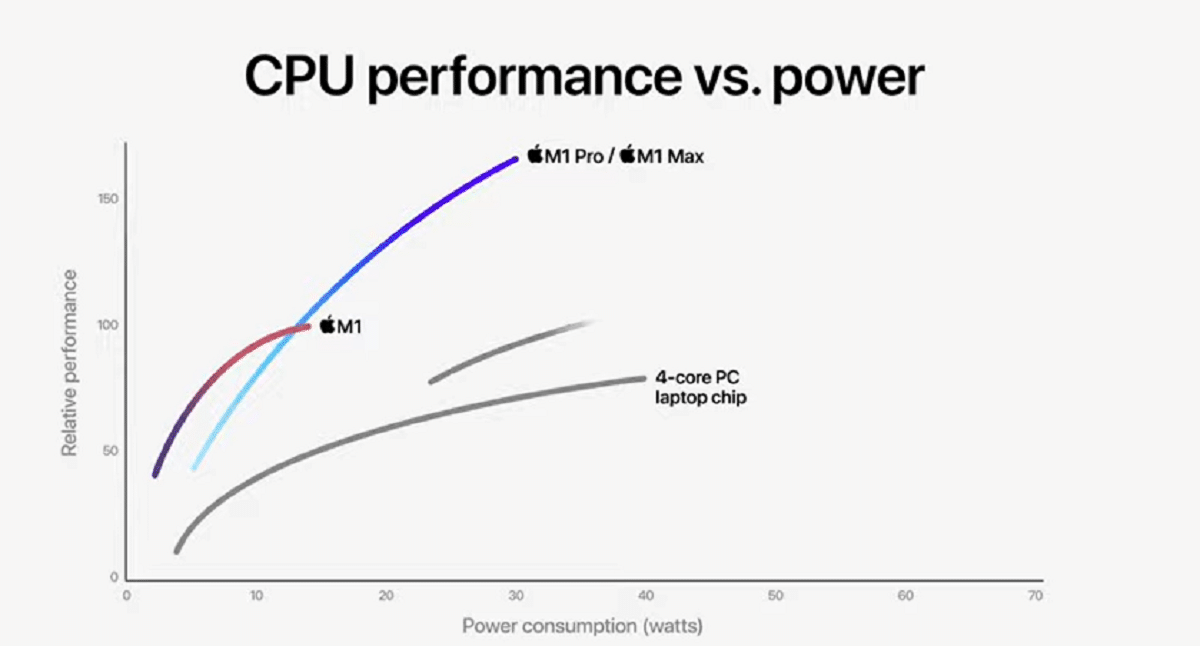
As well put in the header image of this article, the new M1 Pro and Max, are a savage and a savage and a half respectively. They may be Apple's best processors for a laptop to date and not just on paper. It seems that the performance tests attest to this. One of the latest tests to put these chips on the same level as many desktop computers.
When Apple's new MacBook Pros were unveiled, the chips that accompanied them They looked like something out of a science fiction movie. It's like we're talking 15 years from now. Power and reliability that at least seems to be unrivaled in the laptop sector. It seems that in addition they will be able to compete in the field of desktop computers. We always talk about comparisons with computers with Windows operating system.
Why is this known? Basically because the actual CPU cores appear to be the same as found on the base-level M1 chip. Yet everything else that surrounds it, it is much better. So at least they confirm it from AnandTech .:
We had indicated in our initial review that it appeared that Apple's new M1 Pro and Max chips are using similar CPU IP, if not the same generation as in the M1, rather than upgrading things to the next generation cores that are are using on the A15. We can apparently confirm thisas we are not seeing apparent changes in the cores compared to what we have discovered in the M1 chips.

Now, you have to qualify A set of things:
CPU cores peak up to 3228 MHz, however they vary in frequency depending on how many cores are active within a cluster, registering up to 3132 at 2 and 3036 MHz at 3 and 4 active cores.
When saying "per cluster", the following should be understood: The 8 performance cores in the M1 Pro and M1 Max consist of two 4-core clusters, both with their own 2MB L12 caches, and each can register their CPUs independently of each other, so it is actually possible to have four active cores on one 3036 MHz cluster and one active core on the other cluster that is runs at 3,23 GHz.
In other words: That a very high performance is achieved with an exaggerated efficiency. So the final result is ten. But it is also that the surprises do not end here. Memory bandwidth is also three times faster:
The M1 Pro features 5-bit LPDDR256 memory at speeds of 6400MT, corresponding to a bandwidth of 204GB. Remember that the M1 chip reaches 68 GB. it is also higher, as a general rule, than competing portable platforms that still rely on 128-bit interfaces.
Where the M1 Pro and Max stand out most is, in their graphic capabilities

The M1 Pro models offer twice the performance of the M1, while the M1 Max quadruples the M1 figures:
While the original M1 had 8 GPU cores, the M1 Pro gets 16 and the M1 Max gets 32. Every aspect of these GPUs has been scaled up accordingly. The chip's GPU and memory interfaces are by far the most differentiated aspects of the Pro and its bigger brother the M1 Max. In the latter, the GPU runs at up to 1296MHz.
For all the above, the M1 Pro and M1 Max chips manage to achieve performance figures that they were not considered possible on a chip built into a laptop. For all this, they not only outperform other chips used for the same purpose, but also compete against the best desktop systems out there.
In this way it can be said that the new MacBook Pro, They have earned the nickname of Pro with each of their letters. If you want a laptop with strength and that is capable of performing any task with almost minimal effort, it is clear that either of its two versions will be perfect for you. Of course, as long as you can pay them. Because everything we have seen so far is almost unbeatable but what can certainly be improved are those more than two thousand euros of base that the little brother of the MacBook pro costs.